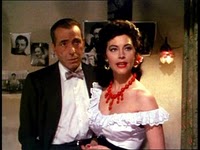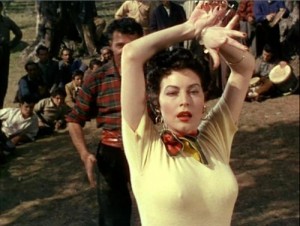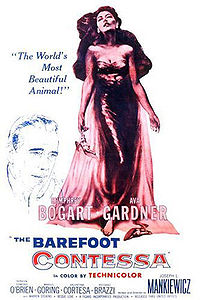A girl with many ideas . . . and a man for each!
Humphrey Bogart plays second fiddle to Ava Gardner in Joe Mankiewicz’s 1954 saga of fame, fortune, and failure in the Hollywood jetset, The Barefoot Contessa.
It is actually more of an ensemble cast, but Bogie is definitely not the star in this tale of an exciting Spanish cabaret dancer (Gardner) who is discovered by film director Harry Dawes (Bogart). Pulling strings along the way is studio publicity man Oscar Muldoon (Edmond O’Brien). During the film our new starlet makes a few pictures and marries, but dies tragically in a failed marriage.
Contessa opens with the funeral of Maria Vargas, our dancer. The story is told via flashback with numerous confusing narrators, but the majority of the narration is from Dawes. The analogy of the movie is to the classic fairy tail Cinderella. We see Maria’s rags to riches transition during the film only to see it disappear in a second, reverting to the proverbial pumpkin. This comparison to Cinderella is noted several times during the picture as well. Perhaps a few too many times.
 That’s the plot in a nutshell. Mankiewicz, who also wrote the screenplay, is not at his best form here. Oftentimes the dialogue is perhaps too finely refined, unlike his previous masterpiece All About Eve. The amount of talking in this picture is astounding for the amount of plot movement and action which takes place. And seemingly whenever one of the cast comes up for air between lines we are besotted with yet another narrator at graveside!
That’s the plot in a nutshell. Mankiewicz, who also wrote the screenplay, is not at his best form here. Oftentimes the dialogue is perhaps too finely refined, unlike his previous masterpiece All About Eve. The amount of talking in this picture is astounding for the amount of plot movement and action which takes place. And seemingly whenever one of the cast comes up for air between lines we are besotted with yet another narrator at graveside!
The picture is shot wonderfully in muted technicolor by the masterful Jack Cardiff. We do not get the somewhat garish bright colors one might expect but rather autumnal oranges and browns which reflect the somber demeanor of the film. Not as good as his masterpiece, 1947’s Black Narcissus, but it isnt his later Rambo: First Blood Part II either. (Yes he did both.)
Gardner, whose star power as the leading sex symbol in the business shown only briefly after the decline of Rita Hayworth and prior to the rise of Marilyn Monroe, does a good job here. Thankfully she drops her imitation Spanish accent after the first few scenes. Although now known at the time, the film turns out being quite autobiographical for Gardner her. Small girl makes good in the world but looses it all in destructive self abuse.
Bogart, as mentioned earlier, isn’t the star of the show here, and he looks drawn and tired, perhaps already feeling the clock near twelve on his illustrious career. His Harry Dawes is softer and more caring than the typical Bogart character, and perhaps it is this type of character Bogie would have liked playing in his later years.
 Edmond O’Brien is quite good as the slimy and shift PR man for which he won an Academy Award. He rounds out an exceptional cast which, coupled with the exotic locales somewhat offset the stifled philosophizing of the dialogue.
Edmond O’Brien is quite good as the slimy and shift PR man for which he won an Academy Award. He rounds out an exceptional cast which, coupled with the exotic locales somewhat offset the stifled philosophizing of the dialogue.
It is a good film, but not great in the history of Hollywood. Better than anything out today, of course.
Get it to see Gardner at the top of her game and Bogart is never a disappointment. This one is out on a lackluster DVD which doesn’t include anything in the way of extras. It would have been nice for a commentary track from Jack Cardiff, who when the disc was released was still living.
